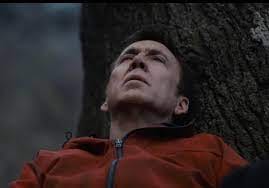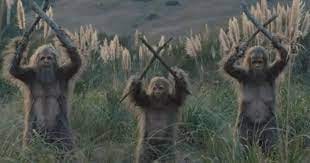Apocalypse Express
My thoughts on Arcadian, Sasquatch Sunset and Sting
Apocalypse Express
If I were to ask you to imagine a film that would star Nicolas Cage as one of the few apparent survivors of an alien invasion of Earth who finds himself still trying to fight off the bizarre and deadly creatures 15 years later, my guess is that you would probably conjure up something much wilder and woolier than Arcadian, the oddly subdued creature feature from Benjamin Brewer. As it begins, we follow Paul (Cage) as he races home through scenes of incomprehensible devastation (which we only see in fleeting glimpses) to get home to his infant twin sons, Joseph and Thomas. When the story picks up 15 years later, he is living in the Irish countryside with his sons—the risk-taking Thomas (Maxwell Jenkins), who is more interested in Charlotte (Sadie Soverall), the girl living at a neighboring farm, than in following stringent safety procedures, and Joseph (Jaeden Martell), a science-minded type seeking a way to actually stop the creatures that continue to scratch on their door every night. One fateful day, Paul sends Thomas and Joseph out to scavenge for supplies, which Thomas uses as an opportunity to bail on his brother in order to see Charlotte. When Thomas fails to return at dusk, which is when the monsters start coming out, Paul sets out to look for him while leaving Joseph at home by himself. I won’t reveal any more of what happens but, suffice it to say, things do not go particularly swimmingly for any of them.
Anyone going to see this film expecting lurid excesses and the kind of over-the-top Cage performance that could be included in YouTube clip reels of his wildest moments may find themselves perplexed by the unexpectedly restrained approach utilized on both counts. Instead of presenting an expansively detailed depiction of the new world and circumstances faced by the characters, the film keeps these details to a minimum—we never learn much about the details of the initial invasion or get any idea of how many survivors there might be outside of the few that appear as the story progresses. Presenting the narrative in such a deliberately streamlined manner is an interesting and at times quite effective choice, though I will confess that there were times when I wish that Michael Nilon’s screenplay was not quite so withholding in this regard. Likewise, the performances are all on a lower key—at least as low as one can get in scenes where they are being ambushed by creatures that might have given H.R. Giger the willies—and are all the more effective for it, especially Cage, whose turn her is closer in spirit to his work in Pig than his wilder performances. As for the creatures, the film makes the smart decision to only reveal them gradually but when we do get a good look at them, they are undeniably nasty beasts (and the fact that they only come out in the dark helps to keep them from looking too much like CGI creations). Admittedly, the restrained storytelling employed by Arcadian may frustrate some viewers looking for goofball trash but those looking for a more realistic take on the alien invasion subgenre should find it to be an intriguing variation on a familiar theme.
I like to think that I am one who is generally willing to embrace oddball films that go out of their way to defy the conventions of commercial cinema. That said, Sasquatch Sunset, the new film from Daniel and Nathan Zellner, is so strange and bewildering that I am still unsure as to how I feel about it. The films observes the lives of a quartet of Sasquatch over the course of a year as they go about their existence in a state of unabashed freedom that is tempered somewhat by their gradual realization that they may not be entirely alone in the world. Two of the Bigfoots (Bigfeet?)—played by Jesse Eisenberg and Riley Keough, unrecognizable under their extensive makeup jobs—are a couple, as is demonstrated early on as we observe them having sex in the middle of a field while their companions watch them quizzically. One of those other two is a younger one (Christophe Zajac-Denek)—he could be their son—who has developed a habit of kissing new creatures that the group happens upon on their journey (which backfires spectacularly when he tries it on a turtle). The other one (played by Nathan Zellner) is older and tries to present himself as the alpha of the group, though his attempts to prove himself as such generally end in disaster. As they go about their journey, they experience, among other things, the joy of life, the heartbreak of death and the inadvertent fun that can be had through the consumption of certain mushrooms that they discover during their foraging.
In their previous films, Kumiko the Treasure Hunter and Damsel, the Zellner have used other movies as springboards for their own weirdo ideas—the former involved a Japanese woman convinced that Fargo was real and that the case full of money is out there waiting to be discovered and the latter is a Western pastiche involving a man risking his life to reach and marry the love of his life, even if she is not that interested—and Sasquatch Sunset fits in along those lines, kicking off with a knowing reference to that infamous 1967 photo of a supposed Sasquatch sighting before essentially transforming into a piss-take (literally at some points) riff on the prehistoric man epic Quest for Fire (1981). For a little while, you have to admire the willingness of the Zellners and their actors to commit to the bit—despite there being no dialogue to speak of at any point beyond a few vague grunts, we are able to quickly suss out the personalities of the characters and how they relate to each other—and there are some very funny bits here and there, such as their every encounter with other animals and their agitated (and usually messy) reaction when they happen upon a stretch of paved road. The problem is that unless you can find yourself riding on the Zellners’ particular wavelength (which I confess i have struggled with in the past), the whole thing may strike you as the sort of thing that might have worked nicely as a short but which struggles to justify even its abbreviated feature length. Compared to most of the rest of what is out there now, Sasquatch Sunset is undeniably unique but in the end, I wanted more. However, if my description of this has piqued your interest, you should probably rush out and catch it now because you most likely won’t be seeing anything like it for a very long time.
Ever since I was a wee lad and was first exposed to the magic of Charlotte’s Web, I have had an inordinate fondness for spiders of all sorts—yes, I am the type that, upon seeing one in the house, gently coaxes it onto a piece of paper and then carefully takes it outside. The upshot of this is that whenever a horror movie tries to utilize a spider as an instant symbol of fear and terror, I am generally not that responsive unless they have bothered to do a little more than just that. Alas, Sting, the new effort from Australian filmmaker Kia Roache-Turner is one of those that just thinks that the sight of a spider—granted, a giant one—is enough but unless you are severely arachnophobic (which means that you probably wouldn’t be there in the first place), there is very little in the way of genuine scares here. As the film opens, an alien spider egg crash-lands in a New York apartment building and its occupant is found by 12-year-old Charlotte (Alyla Browne), who names it Sting after glancing at a handy copy of The Lord of the Rings. Keeping her discovery quiet from her mom Heather (Penelope Mitchell) and stepdad Ethan (Ryan Corr), she teaches Sting tricks and uses it as a way to escape her annoyance at her new baby brother, her unresolved feelings towards her absent father and her unwillingness to fully accept Ethan despite her seemingly apparent fondness for him. Meanwhile, Sting is sneaking out of its enclosure to snack on some of the few other occupants of the building—Heather’s Alzheimer’s-stricken mother (Noni Hazlehurst) and perpetually bitchy aunt (Robyn Nevin), a weird grad student who knows his spiders (Danny Kim), an alcoholic widow (Silvia Colloca) and an exterminator (Jermaine Fowler) who is called in to investigate the increasingly odd goings-on—and grows larger with each snack, leading to a final confrontation between Charlotte and the now-humongous creature.
Even if I didn’t have a general antipathy for films trying to position spiders as creepy monsters, my guess is that I still would not have found much to be interested by in Sting. For most of the first half of the film, the titular creature is mostly kept to the sidelines in order to focus on the tense family dynamic in ways that don’t always make a lot of sense (sure, Charlotte has issues with Ethan stemming from her fear that he will leave as her actual father, who she still inexplicably reveres, did but is also collaborating with him on what appears to be a successful comic book) and which could have easily been streamlined without losing much of anything in the process. Once the arachnid carnage kicks in, the slow burn proves not to be entirely worth the wait—while certainly goopy enough at times, none of it is particularly scary in any way. (Even The Giant Spider Invasion, as stupid of a film as you will ever see, at times managed to display a certain frisson towards its creatures that is utterly lacking here.) As the young heroine, Browne is spunky enough, especially when she turns into a mini-Ripley during the final stretch, but the other characters are so one-dimensional that you can hardly wait for them to be snacked upon. Of course, that final stretch ends on a note that suggests the possibility of a Sting II but unless they figure out a way to include CGI versions of Jackie Gleason and Mac Davis, I cannot imagine anyone emerging from Sting eager for another bite anytime soon.




